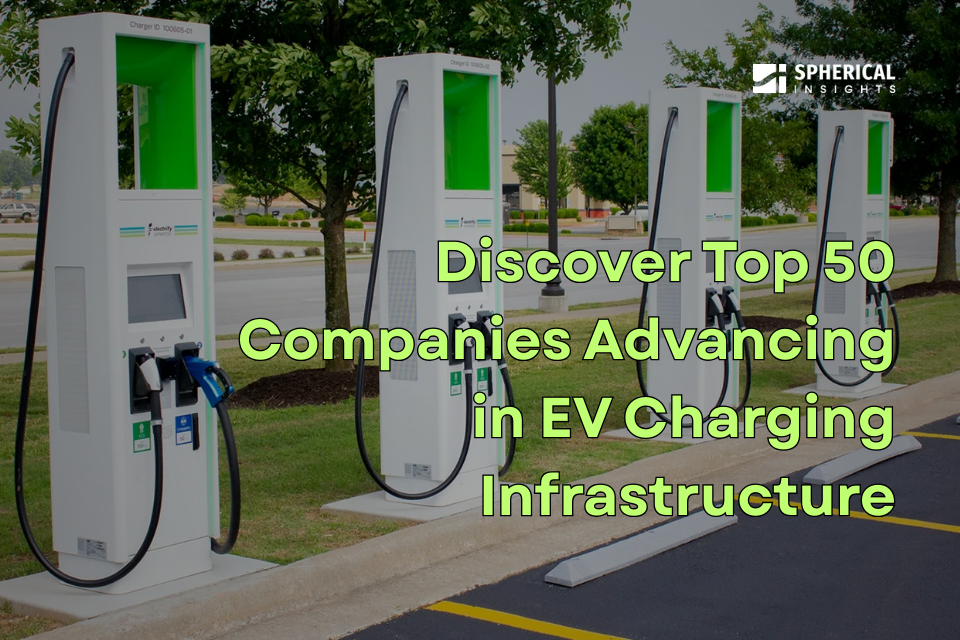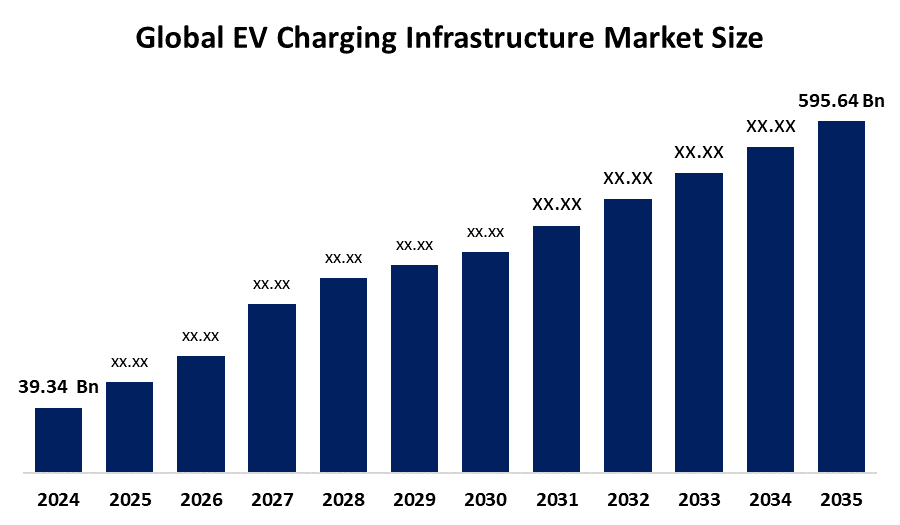
Discover Top 50 Companies Advancing in EV Charging Infrastructure: Global Share, Market Size, Revenue Report (2024-2035)
RELEASE DATE: Aug 2025 Author: Spherical InsightsRequest Free Sample Speak to Analyst
Description
According to a research report published by Spherical Insights & Consulting, The Global EV Charging Infrastructure Market Size is projected To Grow from USD 39.34 Billion in 2024 to USD 595.64 Billion by 2035, at a CAGR of 28.02% over the forecast period 2025–2035. The market growth is influenced due to key factors, including urbanization, significant infrastructure development, rapid EV growth, strong government support, and the presence of important EV fabrication infrastructure that supports such sustainable solutions.
Introduction
EV charging infrastructure, which includes a network of charging stations that allow EVs to recharge their batteries, is an essential part of the electric vehicle (EV) ecosystem. Level 1, Level 2, and Level 3 chargers are included, along with any necessary software and hardware. Moreover, as rising demand for EVs rises, solid government support encourages EV adoption by building a reliable and easily accessible charging infrastructure. The installation of charging stations in homes, workplaces, public regions, and along highways is being funded by private businesses and other utilities. Many countries have enacted tax breaks, subsidies, and policies to reduce greenhouse gas emissions and promote the transition to electric vehicles. These programs include establishing national EV targets, financing charging station infrastructure, and enacting laws about zero-emission automobiles. Furthermore, international collaboration between key companies in sustainable transportation projects has been encouraged the accelerate the development of the market.
Navigate Future Markets with Confidence: Insights from Spherical Insights LLP
The insights presented in this blog are derived from comprehensive market research conducted by Spherical Insights LLP, a trusted advisory partner to leading global enterprises. Backed by in-depth data analysis, expert forecasting, and industry-specific intelligence, our reports empower decision-makers to identify strategic growth opportunities in fast-evolving sectors. Clients seeking detailed market segmentation, competitive landscapes, regional outlooks, and future investment trends will find immense value in the full report. By leveraging our research, businesses can make informed decisions, gain a competitive edge, and stay ahead in the transition toward sustainable and profitable solutions.
Unlock exclusive market insights - Download The Brochure now and dive deeper into the future of the EV Charging Infrastructure Market.
EV Charging Infrastructure Market Size & Statistics
- The Market Size for EV Charging Infrastructure Was Estimated to be worth USD 39.34 Billion in 2024.
- The Market Size is Going to Expand at a CAGR of 28.02% between 2025 and 2035.
- The Global EV Charging Infrastructure Market Size is anticipated to reach USD 595.64 Billion by 2035.
- Asia Pacific is projected to generate the highest share during the forecast period in the EV Charging Infrastructure Market
- Europe is anticipated to grow the fastest during the forecast period in the EV Charging Infrastructure Market.

Regional growth and demand
Europe is expected to grow the fastest over the forecast period in the EV Charging Infrastructure market. The charging infrastructure in Europe is among the most well-established in the world. EV charging stations in the regional subcontinent are increasingly equipped with wireless connectivity. Further, government agencies, various commercial businesses, and the charging infrastructure are all fostered by the region's vendors. The region has a strong commitment to decarbonization and environmental goals as part of the EU's Green Deal and its aggressive targets for reducing greenhouse gas emissions by 2030. Further, regional market development, which was heightened by Germany EV infrastructure expansion and its development.
Asia Pacific is expected to generate the largest revenue share during the forecast period in the EV Charging Infrastructure market. The EV Charging Infrastructure market with the quickest rate of growth throughout the study period is anticipated to be in the Asia Pacific. The Asia-Pacific region contributes an important portion of the world's GDP and has its largest market share. China, India, Japan, South Korea, and numerous other nations are part of this region. These elements stimulate demand for goods and services, draw in investments from multinational firms, and support the region's economic growth and development. Further driving the Asia-Pacific market's expansion and worldwide prominence are favorable government policies, increasing urbanization, and increasing disposable incomes.
Top 10 trends in the EV Charging Infrastructure Market
- Rapid Deployment of DC Charging
- Bidirectional and Vehicle-to-Grid (V2G) Charging
- AI-Based Load Management and Intelligent Charging
- Ensuring uniformity and compatibility (OCPP, ISO 15118, ChaoJi)
- Public Charging Networks Expand Quickly
- Battery storage and integration with renewable energy
- Integration of Mobile Apps, Cloud, and IoT
- Models of Subscription and Charging-as-a-Service (CaaS)
- Connecting Smart Cities and Urban Charging
- New Business Models and Market Structure
1. AI-Based Load Management and Intelligent Charging
AI systems allocate available power in real time across multiple charging stations, preventing grid overload while enabling simultaneous charging of many vehicles without exceeding infrastructure limits. In electric vehicle (EV) infrastructure, AI-based load management and intelligent charging employ AI to dynamically regulate when, where, and how EVs charge, optimizing energy distribution, improving grid stability, cutting costs, and improving user experience.
2. Battery storage and integration with renewable energy
In order to integrate renewable energy sources like wind and solar into power grids, battery storage systems are essential because they smooth out intermittency, stabilize the energy supply, and make clean, dependable power available. The goals of battery energy storage systems (BESS) in 2025 include boosting grid resilience, frequency management, peak load shifting, and meeting the demand for electric vehicles, in addition to storing power.
3. Integration of Mobile Apps, Cloud, and IoT
Modern EV charging infrastructure depends heavily on the integration of mobile apps, cloud computing, and the Internet of Things (IoT) since it facilitates smooth user experiences, effective energy management, and real-time operational insights. Cloud-based systems gather and analyze enormous volumes of data from charging stations on the backend, allowing for analytics on energy consumption, predictive maintenance, and remote monitoring.
4. Connecting Smart Cities and Urban Charging
Electric vehicle (EV) charging stations are vital components of the smart city ecosystem that are connected to municipal EV charging infrastructure in order to support cleaner, more sustainable urban mobility. The transition to electric vehicles is facilitated by EV charging infrastructure, which lowers emissions and helps the resilience, efficiency, and connectivity objectives of smart cities.
5. New Business Models and Market Structure
In the field of electric vehicle (EV) charging infrastructure, new business models and market structures are developing to accommodate growing EV adoption and build lucrative, sustainable ecosystems for operators, consumers, and energy suppliers. These models cater to individual customers, fleet operators, and commercial users by providing flexible, pay-per-use, or subscription-based choices.
Empower your strategic planning:
Stay informed with the latest industry insights and market trends to identify new opportunities and drive growth in the EV Charging Infrastructure market. To explore more in-depth trends, insights, and forecasts, please refer to our detailed report.
Top 05 Companies Leading the EV Charging Infrastructure Market
- Volterio
- Enermove
- Hypervolt
- RossiniEnergy
- Elinta Charge
1. Volterio
Headquarters: Graz, Austria
Volterio, an Austrian startup, provides an automated electric vehicle charging system. The autonomous conductive charging system developed by the business stays rooted in the ground and works with a variety of electric vehicles, including professional and sports automobiles. The system charges using a robotic model. The ground unit, which is controlled by an ultrasound-based micro-navigation system, automatically links to the vehicle unit under the car's underbody when charging is requested. With an intelligent charge management system, the charging process can be scheduled or initiated automatically. In addition, the method uses alternating supply grid loads to maximize the ratio of charging capacity to duration.
2. Enermove
Headquarters: Turin, Italy
Industrial electrical vehicle dynamic wireless charging systems are offered by the Italian firm Enermove. The startup's wireless power transfer system makes use of resonant magnetic coupling technology. The technology consists of receivers on the cars and a transmitter on the ground that pair magnetically. The system becomes resonant due to the associated capacitors, which minimizes the size of the power electronics and maximizes the transferred power. The approach removes the need for pauses for battery replacement or recharging by offering continuous vehicle charging.
3. Hypervolt
Headquarters: London, UK
Dynamic load charging solutions are offered by the British startup Hypervolt. Ethernet or Wi-Fi networks are used by the startup's charging technology to maximize charging. The technology can be used with solar panel installations that allow for solar charging. Following energy tariffs, the charging system schedules the vehicle's charging and automatically adapts to the load. Commercial solutions from the startup allow for charging-based energy tariff reductions, dynamic load management, and use monitoring. AI-based automatic number plate recognition (ANPR) technologies are also used in the solutions to automatically track foot traffic and stop ICEing and excessive charger use.
4. RossiniEnergy
Headquarters: Villeneuve-d’Ascq, France
RossiniEnergy, a French firm, creates solar energy storage and charging systems for parked electric cars. Electric vehicles are charged using the startup's solar charging canopy, TOSSO, which uses solar energy. Additionally, industrial solar charging solutions are developed by the startup. Solar energy self-consumption is maximized by the bidirectional chargers. In addition, the startup provides energy storage systems, such as Cloudino and EDI. These devices use the existing charger to initiate battery charging in order to store extra solar energy. Cloudino uses less electricity because the building is powered by a battery.
5. Elinta Charge
Headquarters: Kaunas, Lithuania
Elinta Charge is a Lithuanian firm that offers electric and hybrid vehicle charging stations for multiple automobiles. The stations have increased endurance thanks to the startup's approach, which uses anodized extruded aluminum material. By allocating energy based on availability, the technology enables power balancing for multi-vehicle charging. The electric car, charging station, and any other on-site equipment all use the same amount of energy due to the solution's dynamic load control. Additionally, the device is equipped with intelligent sensors that continuously check for dangerous DC residual currents. Should they find any, the system will cease charging until the leak is fixed.
Are you ready to discover more about the EV Charging Infrastructure market?
The report provides an in-depth analysis of the leading companies operating in the global EV Charging Infrastructure market. It includes a comparative assessment based on their product portfolios, business overviews, geographical footprint, strategic initiatives, market segment share, and SWOT analysis. Each company is profiled using a standardized format that includes:
Company Profiles
- Volterio
- Business Overview
- Company Snapshot
- Products Overview
- Company Market Share Analysis
- Company Coverage Portfolio
- Financial Analysis
- Recent Developments
- Merger and Acquisitions
- SWOT Analysis
- Enermove
- Hypervolt
- RossiniEnergy
- Elinta Charge
Conclusion
The EV Charging Infrastructure (WMS) market is accelerating due to solid technology integration, strong policy support, changing business models, and international cooperation. The EV charging infrastructure market goal is to create dependable, easily accessible, and sustainable charging networks that will facilitate the global shift to electric mobility. Europe is anticipated to develop at the fastest rate because of its sophisticated infrastructure and environmental objectives, while the Asia Pacific is anticipated to hold the highest revenue share due to substantial economic growth, urbanization, and robust governmental incentives. Leading innovators in this field include startups such as RossiniEnergy, Enermove, Hypervolt, and other major key players that boost this market growth.
About the Spherical Insights & Consulting
Spherical Insights & Consulting is a market research and consulting firm which provides actionable market research study, quantitative forecasting and trends analysis provides forward-looking insight especially designed for decision makers and aids ROI.
Which is catering to different industry such as financial sectors, industrial sectors, government organizations, universities, non-profits and corporations. The company's mission is to work with businesses to achieve business objectives and maintain strategic improvements.
CONTACT US:
For More Information on Your Target Market, Please Contact Us Below:
Phone: +1 303 800 4326 (the U.S.)
Phone: +91 90289 24100 (APAC)
Email: inquiry@sphericalinsights.com, sales@sphericalinsights.com
Contact Us: https://www.sphericalinsights.com/contact-us
Need help to buy this report?